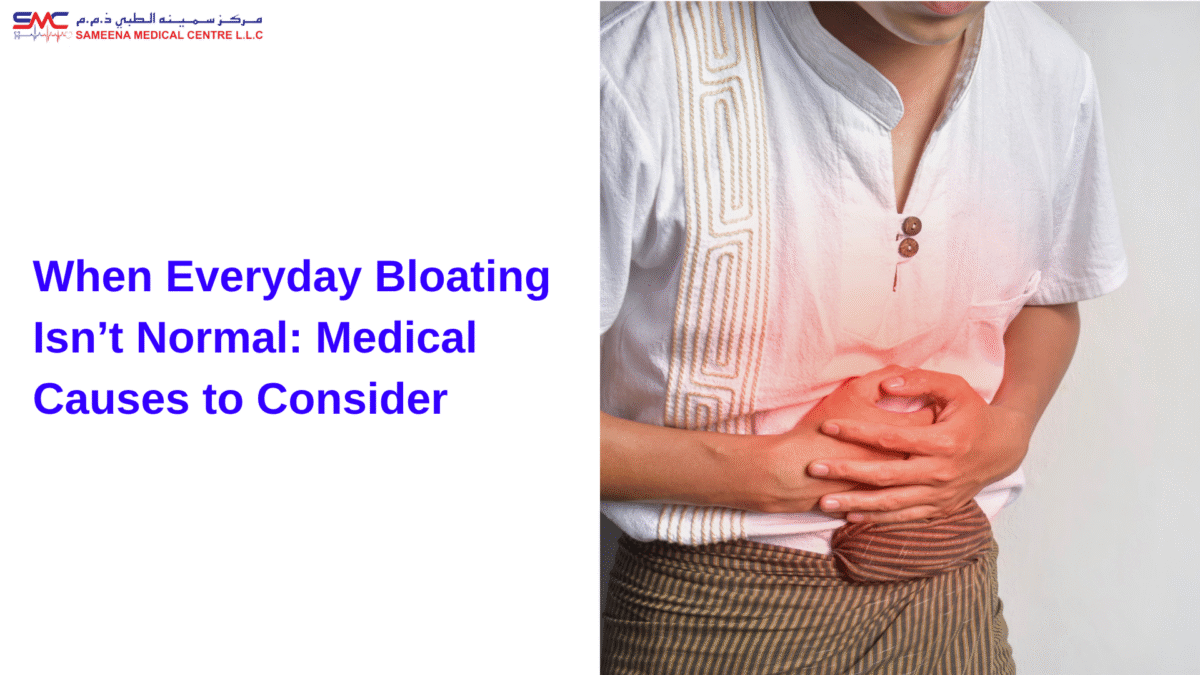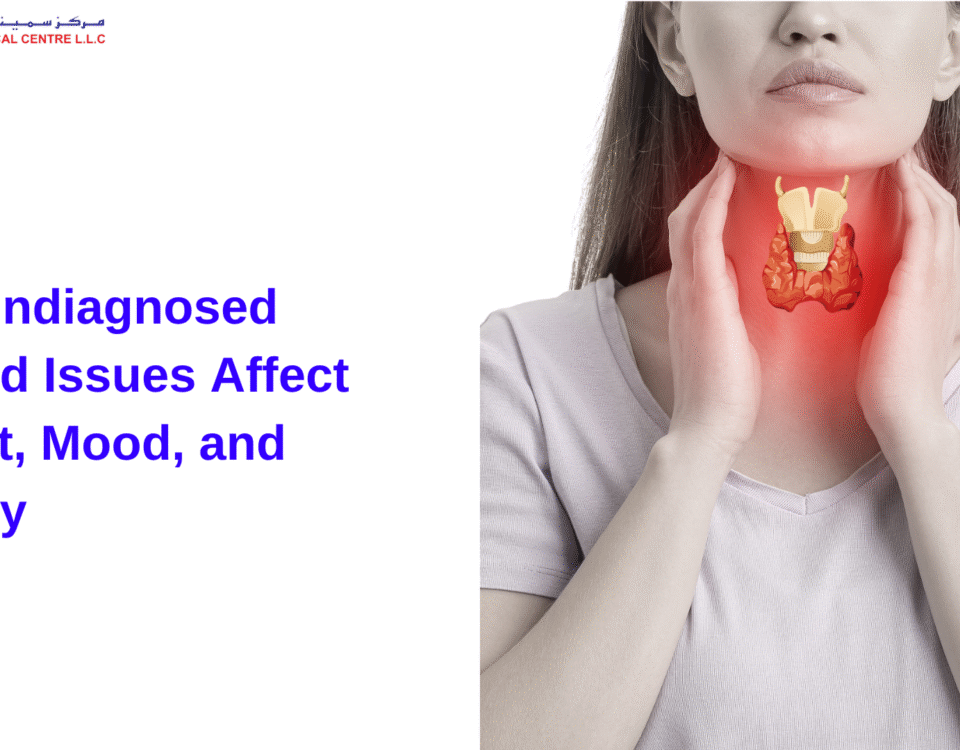
What Frequent Urination Can Reveal About Your Health
July 16, 2025
Best Medical Tests for Detecting Nutrient Deficiencies Early
July 30, 2025When Everyday Bloating Isn’t Normal: Medical Causes to Consider

Everyone feels bloated occasionally: after a heavy meal, a fizzy drink, or during certain phases of the menstrual cycle. But if you’re noticing it too often, too severely, or without a clear reason, your body might be telling you something more. Persistent bloating can be a symptom of an underlying medical issue that needs more than just dietary tweaks.
The truth is, chronic bloating isn’t always about what you ate. It could be your gut, hormones, or an undiagnosed condition quietly building up. If bloating has become a regular part of your life, it’s time to stop guessing and start exploring the possible medical causes. A proper evaluation can help identify the real issue, whether it’s a gut imbalance, inflammation, or something hormonal. A complete investigation of the causes of bloating is the only way to get real answers and lasting relief.
Medical Reasons Behind Persistent or Unusual Bloating
If your bloating doesn’t seem to respond to food changes or happens without warning, a medical cause is likely. The following conditions are some of the most common and often overlooked reasons behind unexplained bloating.
Irritable Bowel Syndrome (IBS)
IBS affects how the gut contracts and processes food, which can lead to bloating, gas, cramping, and irregular bowel habits. The bloating in IBS often worsens as the day goes on, even when you haven’t eaten much. Stress and certain trigger foods make it worse, but the root lies in how your gut is functioning, not just what’s in it.
Lactose or Gluten Intolerance
If your body can’t digest lactose (the sugar in milk) or gluten (a protein in wheat), it responds with gas, bloating, and discomfort. These intolerances don’t always come with dramatic reactions. Sometimes, they just leave you constantly swollen, foggy, or fatigued after eating. The tricky part? You might not even notice the connection without testing.
Small Intestinal Bacterial Overgrowth (SIBO)
SIBO occurs when excess bacteria grow in the small intestine, disrupting digestion and fermenting food before it’s broken down properly. The result: bloating that appears quickly after eating, with a tight, distended belly that doesn’t match your food intake. SIBO is often misdiagnosed as IBS but requires a different treatment approach entirely.
Celiac Disease or Chronic Inflammation
Celiac disease is an autoimmune condition where gluten damages the small intestine lining, impairing nutrient absorption and triggering inflammation. Bloating is often the first red flag, along with fatigue, skin issues, or unexplained weight changes. Other chronic inflammatory gut conditions, like Crohn’s disease or microscopic colitis, can cause similar symptoms.
Constipation and Poor Gut Motility
If your digestive system is sluggish, waste stays in the intestines longer than it should. This slows down gas movement and causes the belly to feel heavy, stretched, and uncomfortable. You don’t have to be visibly constipated to suffer from bloating caused by poor motility. Even subtle delays in bowel habits can lead to major discomfort.
Gastroesophageal Reflux Disease (GERD)
With GERD, stomach acid flows back up into the esophagus, often accompanied by bloating, burping, and a persistent feeling of fullness. GERD-related bloating tends to worsen after meals and while lying down. It’s more than just heartburn. It’s a digestive dysfunction that can present in different ways for different people.
Hormonal Conditions and Endometriosis
For many women, hormonal fluctuations tied to the menstrual cycle can cause noticeable bloating. When it’s severe, consistent, or not tied to your cycle, it might point to something like endometriosis or PCOS. Endometriosis, in particular, can cause abdominal swelling that mimics digestive bloating, yet the source is gynecological.
Ovarian Cysts or Reproductive Health Concerns
Larger ovarian cysts can press against the abdomen, causing persistent bloating, pelvic pain, or irregular cycles. In some cases, bloating might be the only symptom until the cyst grows large enough to cause complications. Any long-term bloating that doesn’t respond to food changes should prompt a closer look at reproductive health.
Signs Your Bloating Is a Serious Issue
Occasional bloating isn’t alarming, but chronic or sudden bloating paired with other symptoms could signal something deeper.
- Sudden Bloating with Rapid Weight Loss: May indicate serious digestive or gynecological conditions.
- Bloating with Pain, Blood in Stool, or Fever: Could point to inflammatory bowel disease or infection.
- Daily Bloating Unrelated to Food: Might stem from hormonal or structural issues.
- Bloating That Worsens at Night or After Small Meals: Common in SIBO or digestive motility disorders.
If your bloating comes with these signs, it needs medical attention.
What Tests Can Help Diagnose the Root Cause of Bloating
Identifying the source of chronic bloating requires more than guessing based on symptoms. The right tests can offer clear, measurable answers and guide effective treatment.
Common Medical Tests for Bloating
Abdominal Ultrasound or CT Scan
Imaging helps detect structural problems like cysts, fibroids, or bowel obstructions.
Lactose and Gluten Tolerance Testing
Blood or breath tests reveal how your body responds to these common irritants.
Stool Test for Gut Health
Evaluates digestion, inflammation, parasites, and microbiome imbalance.
Endoscopy or Colonoscopy
Used to visually assess the upper or lower GI tract for signs of disease or damage.
Hormonal Blood Panels
Help rule out thyroid dysfunction, PCOS, or estrogen/progesterone imbalances.
Conclusion
If you’re dealing with bloating that lingers or keeps coming back, it’s not something you have to live with. The cause might be digestive, hormonal, or something deeper, and you won’t know until you investigate properly. Once the root cause is identified, treatment becomes much more straightforward.
At Sameena Medical Centre, we help patients get real answers through targeted evaluations and diagnostics. If bloating is disrupting your routine or making you feel off every day, it’s worth finding out why. Every symptom is a signal, and you deserve clarity and comfort.





